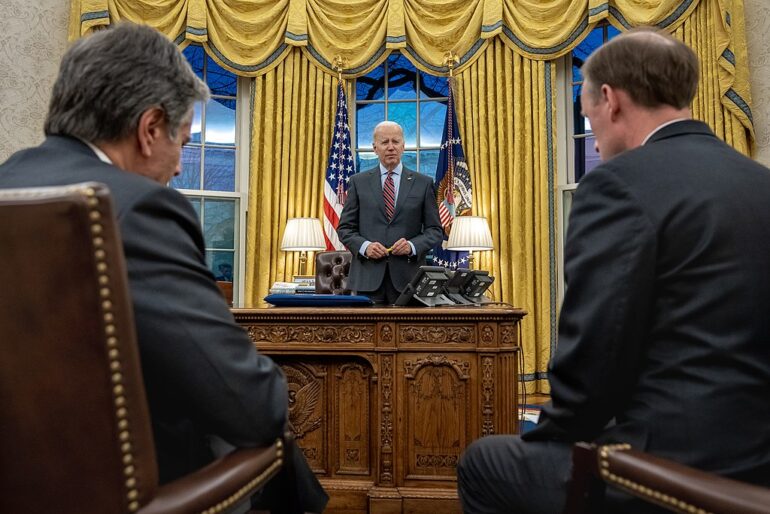Prime Minister Binyamin Netanyahu (Likud) made clear at a press conference Saturday night there is heavy American pressure against several components of Israel’s war against Hamas.
The prime minister pledged, however, to continue the military campaign in Gaza until Hamas is removed from power and the roughly 240 hostages it seized are returned to Israel.
At the press conference alongside Defense Minister Yoav Gallant (Likud) and fellow war cabinet minister Benny Gantz (National Unity), Netanyahu also dismissed several “incorrect reports” about imminent deals between Israel and Hamas to free some or all of the hostages, stating that “as of now there is no deal.”
He added that if a deal were to emerge, the Israeli public would be updated.
Netanyahu further reported that Israel has “eliminated thousands of terrorists” – including senior commanders – and destroyed many Hamas command posts and tunnels.
“We’re moving forward with full force.”
In a Washington Post op-ed on Saturday, US President Joe Biden reaffirmed his commitment to Washington’s long held “two-state solution” policy aimed at dividing the land into two separate states.
To this objective, Biden urged the international community to help manage security in the Gaza region for an interim period after the war until the American-back Palestinian Authority could effectively take control.
“As we strive for peace, Gaza and the West Bank should be reunited under a single governance structure, ultimately under a revitalized Palestinian Authority, as we all work toward a two-state solution,” the president wrote.
Netanyahu responded to Biden’s call for the Fatah-led PA to ultimately govern Gaza by saying that the PA in its current form is “not fit” to do so.
While the United States had publicly expressed full throated support for Israel’s war after the horrific Simḥat Torah massacre on October 7, Prime Minister Netanyahu said that “there is growing pressure against us, in the US and elsewhere.”
The premier listed several examples of Israel’s resistance to pressure from Washington and its allies in recent weeks, including pressure not to launch a ground invasion into Gaza, not to enter Gaza City, and not to go into Shifa Hospital.
“They also pressed us to agree to a full ceasefire,” he revealed. “We refused. And I made clear that we would only agree to a temporary ceasefire and only for the return of our hostages.”
“Together with my colleagues, I rebuff the pressure and make clear to the world: We will continue to fight until victory. Until we destroy Hamas. And until we bring our hostages home.”
“We are insisting on our essential security and diplomatic interests,” he added.
“In the face of heavy opposition. When our enemies and our friends recognize our firm stance, when they hear it in international media interviews, and in discussions with leaders, we obtain the necessary room for maneuver to continue the operation. This cannot be taken for granted.”
Despite the public appearance of strong US support, some very clear points of contention between Israeli and American interests have been clear since the beginning of this war.
Washington had no problem with Israeli air strikes killing Palestinian civilians. But the empire deeply objected to an Israeli ground incursion into Gaza.
The Biden administration’s strong opposition to an Israeli military presence in Gaza likely derives from a fear that Israel could use this war to reverse the 2005 Disengagement, when then-President George W. Bush forced Israel to remove its entire military presence from the territory, along with the thousands of Jews who had lived there.
While Israel has had to fight a war with Hamas roughly every 2-3 years since the Disengagement, the bloody events of Simḥat Torah have made clear to much of the Israeli public how mistaken our leadership had been to let the Americans force us to surrender Gaza.
Despite the best efforts of many “security experts” to close the gap between American demands and Israeli security needs, no one has succeeded in presented a realistic alternative to full Israeli military control in Gaza. And because Netanyahu resisted Biden’s pressure to avoid a ground incursion, the next point of contention between Washington and Jerusalem centers on who should take responsibility for Gaza after the war.
The US empire’s nightmare scenario would be Israel retaking Gaza as this move would bring closer the possibility of Jerusalem eventually officially absorbing it, along with the West Bank, into the State of Israel – something the Americans have worked to prevent since the 1967 Six Day War. But because the American public has no stomach for a US occupation of Gaza, the only option Biden can push for is an international force to maintain security in the strip.
Netanyahu has so far rejected such a proposal, maintaining that the only acceptable outcome for the time being would be an Israeli military presence inside Gaza to take responsibility for all security matters.
Netanyahu’s behavior indicates that he must be fully conscious of his own political situation.
Washington has attempted to remove him from office on several occasions (succeeding in 1999 and 2019-2021 but failing at least once in 2015) and has been working to do so since he formed his current coalition in late 2022 through mass anti-government protests. The local and foreign press have been working tirelessly to blame the Simḥat Torah massacre on Netanyahu and even pro-Israel talking points among US political figures have included calls for his resignation.
By this point, Netanyahu should understand that he no longer has anything to lose by pursuing the policies he sees as best for the nation.
At worst, this is his final opportunity to actualize his ideological vision before ending his political career.
But at best, the strength and leadership demonstrated by a decisive victory against Hamas, effective resistance to US pressure and the restoration of full Israeli sovereignty over Gaza (with an option to rebuild the nearly two dozen Jewish communities destroyed in 2005) would win back the Israeli public, thwart the media’s blatant attempts to portray Netanyahu as a failed leader and grant him a few more years as prime minister.





